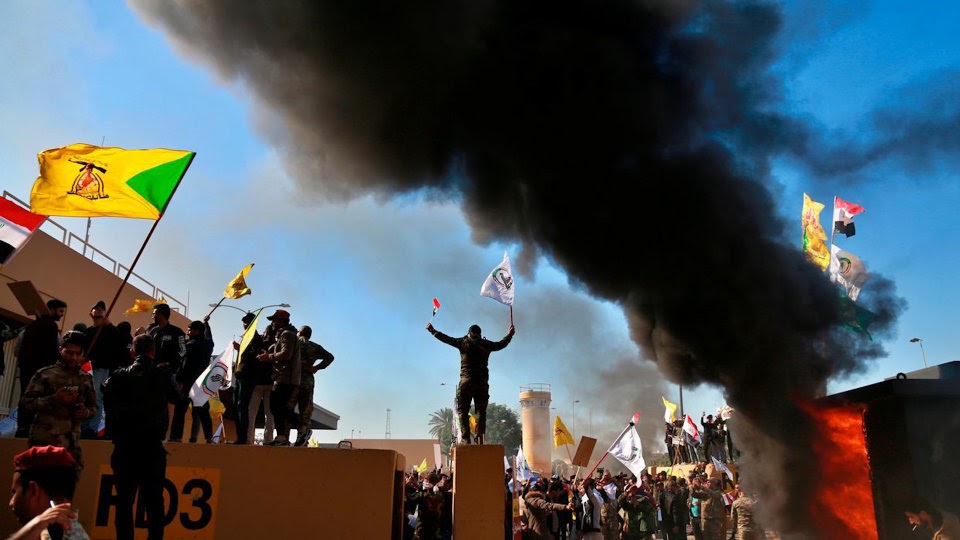By Medea Benjamin and *Nicolas J S Davies
It's a new year, and the U.S. has found a new enemy -- an Iraqi militia called Kata'ib Hezbollah. How tragically predictable was that? So who or what is Kata'ib Hezbollah? Why are U.S. forces attacking it? And where will this lead?
Kata'ib Hezbollah is one of the Popular Mobilization Units (PMU) that were recruited to fight the Islamic State after the Iraqi armed forces collapsed and Mosul, Iraq's second-largest city, fell to IS in June 2014. The first six PMUs were formed by five Shiite militias that all received support from Iran, plus Muqtada al-Sadr's Iraqi nationalist Peace Company, the reincarnation of his anti-occupation Mahdi Army militia, which he had previously disarmed in 2008 under an agreement with the Iraqi government.
Kata'ib Hezbollah was one of those five original Shiite militias and it existed long before the fight against IS. It was a small Shiite group founded before the U.S. invasion of Iraq in 2003, and was part of the Iraqi Resistance throughout the U.S. occupation. In 2011, it reportedly had 1,000 fighters, who were paid $300 to $500 per month, probably mainly funded by Iran. It fought fiercely until the last U.S. occupation forces were withdrawn in December 2011, and claimed responsibility for a rocket attack that killed five U.S. soldiers in Baghdad in June 2011. Since forming a PMU in 2014, its leader, Abu Mahdi al-Muhandis, has been the overall military commander of the PMUs, reporting directly to the National Security Adviser in the Prime Minister's office.
In the fight against IS, the PMUs proliferated quickly. Most political parties in Iraq responded to a fatwa by Grand Ayatollah al-Sistani to form and join these units by forming their own. At the peak of the war with IS, the PMUs comprised about 60 brigades with hundreds of thousands of Shia fighters, and even included up to 40,000 Sunni Iraqis.
In the context of the war against the Islamic State, the U.S. and Iran have both provided a great deal of military support to the PMU and other Iraqi forces, and the Iraqi Kurdish peshmerga have also received support from Iran. Secretary of State John Kerry met with Iranian Foreign Minister Mohammad Zarif in New York in September 2014 to discuss the crisis, and U.S. Ambassador Stuart Jones said in December 2014, "Let's face it, Iran is an important neighbor to Iraq. There has to be cooperation between Iran and Iraq. The Iranians are talking to the Iraqi security forces and we're talking to Iraqi security forces... We're relying on them to do the deconfliction."
U.S. officials and corporate media are falsely painting Kata'ib Hezbollah and the PMUs as independent, renegade Iranian-backed militias in Iraq but they are really an official part of the Iraq security forces. As a statement from the Iraqi prime minister's office made clear, the U.S. airstrikes were an "American attack on the Iraqi armed forces." And these were not just any Iraqi military forces, but forces that have borne the brunt of some of the fiercest fighting against the Islamic State.
Open hostility between U.S. forces and Kata'ib Hezbollah began six months ago, when the U.S. allowed Israel to use U.S. bases in Iraq and/or Syria to launch drone strikes against Kata'ib Hezbollah and other PMU forces in Iraq. There are conflicting reports on exactly where the Israeli drones were launched from, but the U.S. had effective control of Iraqi airspace and was clearly complicit in the drone strikes. This led to a campaign by Shia cleric/politician Muqtada al-Sadr and other anti-occupation parties and politicians in the Iraqi National Assembly to once again call for the expulsion of U.S. forces from Iraq, as they successfully did in 2011, and the U.S. was forced to accept new restrictions on its use of Iraqi airspace.
Then, at the end of October, U.S. bases and the Green Zone in Baghdad came under a new wave of rocket and mortar attacks. While previous attacks were blamed on the Islamic State, the U.S. blamed the new round of attacks on Kata'ib Hezbollah. After a sharp increase in rocket attacks on U.S. bases in December, including one that killed a U.S. military contractor on December 27, the Trump administration launched air strikes on December 29 that killed 25 members of Kata'ib Hezbollah and wounded 55. Prime Minister Abdul-Mahdi called the strikes a violation of Iraqi sovereignty and declared three national days of mourning for the Iraqi troops that U.S. forces killed.
(Note: You can view every article as one long page if you sign up as an Advocate Member, or higher).






